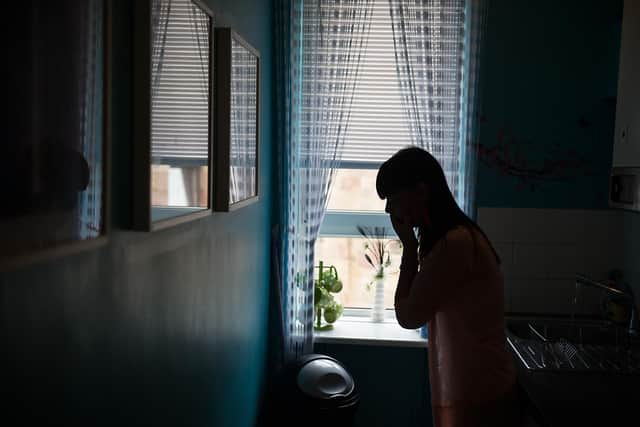International Day for the Elimination of Violence Against Women: If Humza Yousaf is serious about this issue, here's one thing he should do – Susan Dalgety
Today, more than 130 women and girls will be killed by a member of their family. Every year, a total of 89,000 women and girls are killed simply because of their sex. Seven weeks ago, when Hamas terrorists invaded south Israel, they targeted women and girls, carrying out unspeakable acts of sexual violence. And across the UK, every three days, one woman is killed by a man.
Violence against women is a pandemic. It infects every society, every country across the world. And for the majority, there is no protection. According to the United Nations, an overwhelming number of women (86 per cent) live in countries without robust legal protections against violence.
Advertisement
Hide AdAdvertisement
Hide AdIt is, according to MSP Pam Gosal, “one of the most pervasive and prevalent human rights violations”. In a motion to the Scottish Parliament to mark today’s International Day for the Elimination of Violence Against Women, and the 16 Days of Activism that will follow, she called for investment in prevention, in women’s rights organisations and in local services for women.
Scotland’s Fund to Leave scheme a ‘matter of life and death'
Her call echoes the theme of this year’s campaign by the UN which is, “Unite! Invest to prevent violence against women and girls”. Global funding for international development is around $200 billion a year, yet only 0.2 per cent of that goes on work to prevent violence against women.
The picture here in Scotland is mixed. The Equally Safe strategy – a joint venture between the Convention of Scottish Local Authorities (Cosla), Police Scotland, Health Scotland and specialist support groups like Scottish Women's Aid – focuses on prevention, providing a national framework for local services.
According to the Scottish Government, there are record levels of funding to tackle the problem, including the recent announcement of £500,000 for the Fund to Leave scheme, which will offer financial support to help women and their children leave abusive relationships. These new resources have been welcomed by Scottish Women’s Aid, whose chief executive, Marsha Scott, said she was “utterly delighted.”


Closer examination reveals that it took three years for the Scottish Government to find even this modest sum. Ministers agreed to set up a scheme in 2020, but then nothing happened. Only last year, Marsha Scott said the lack of money was “a matter of life and death” for women and children experiencing domestic abuse and that women were being forced to “choose between staying with abusers or experiencing homelessness and destitution” because of a lack of financial support.
Domestic abuse a driver of women’s offending
Three months ago, Pam Gosal, through a series of parliamentary questions, exposed the fact that the government had not even established a timetable for the fund. A few weeks later, the First Minister found half a million pounds for Scottish Women’s Aid to deliver grants to women in five local authority areas. Ending violence against women and girls is a key priority for the Scottish Government, said Humza Yousaf in the resulting news release. His definition of a ‘key priority’ does not bear close examination.
Perhaps the First Minister might now consider funding another women’s service, where arguably the most vulnerable women in the country have received specialist support since 2005. Turning Point 218 in Glasgow provides alternatives to custody for women in the justice system. As its website says, many of the women who use the service will have a range of complex needs, such as problematic alcohol or other drug use, mental health, physical health, trauma, chronic low self-esteem and self-confidence, as well as social isolation.
And far too many will have been victims of domestic violence. A 2017 report by the Prison Reform Trust – which Turning Point 218 contributed to – confirmed what previous research had suggested: domestic abuse is a driver of women’s offending. A police inspector involved in a women’s diversion scheme summed up the problem: “I have been astounded by the number of female offenders who are victims of domestic abuse and how that is a significant trigger to their offending.”
Advertisement
Hide AdAdvertisement
Hide AdWe can end violence against women
Yet earlier this week, Turning Point 218 announced its lifeline service was to close for good in February next year, after Glasgow City Council offered the service only £650,000 a year, less than half of the previously agreed budget of £1.37 million. Patrick McKay, Turning Point’s director of operations, told STV he was “deeply saddened” by the outcome and “the impact this will have on the vulnerable women”.
There is nowhere else for the women who use the service to go, said Linda Wilson of Unite. “The alternative route to the 218 service is a return to the justice system and ultimately through the prison gates.” Annmarie Ward, chief executive of addiction charity FavorUK, was even more robust. She likened the funding cut to an “act of violence” against the women whose lives depend on the service.
At a ceremony to mark today and the start of the 16 Days of Activism, UN Women executive director, Sima Bahous, said it was time for the world to get serious “and fund what we know works to stop violence against women and girls”. She urged governments to “provide services to survivors” and “scale up evidence-based prevention interventions”. “We have the solutions and resources to end violence against women and girls in our lifetimes,” she added. ”It is our choice.”
The women who depend on the Turning Point 218 service have no choice. For many, their addiction and offending will be driven by the violence they have suffered and continue to endure. If ending violence against women and girls really is one of the First Minister’s “key priorities”, then he could save Turning Point 218 with one phone call. It’s his choice.